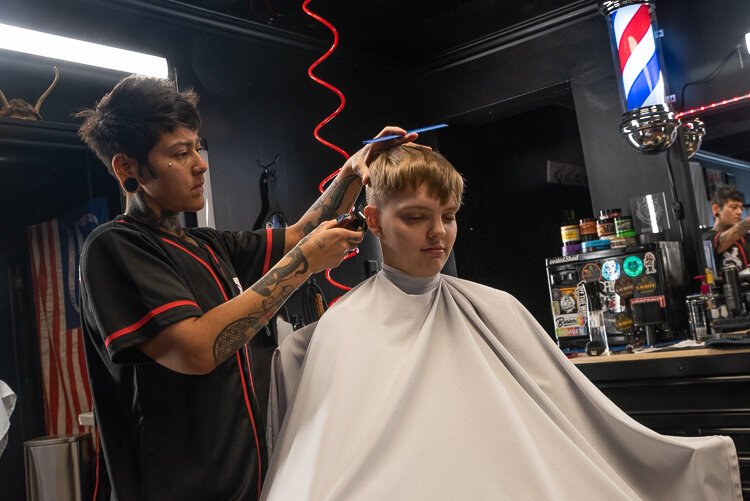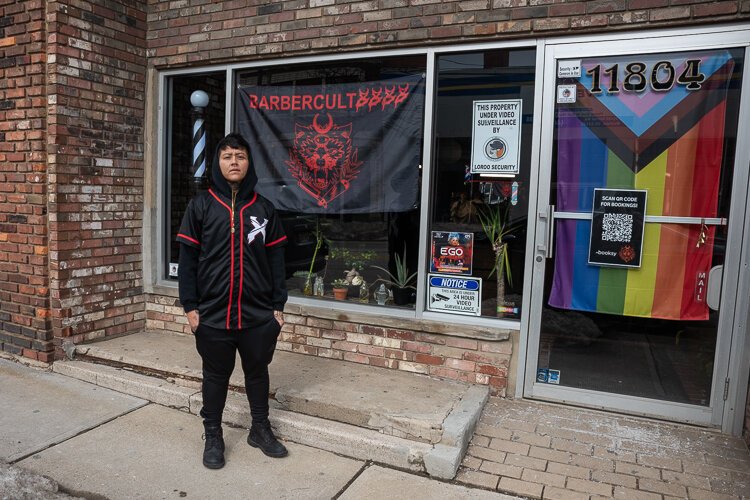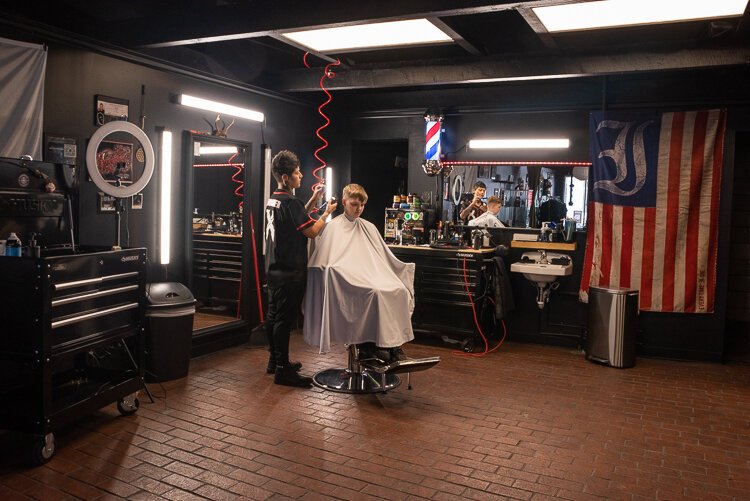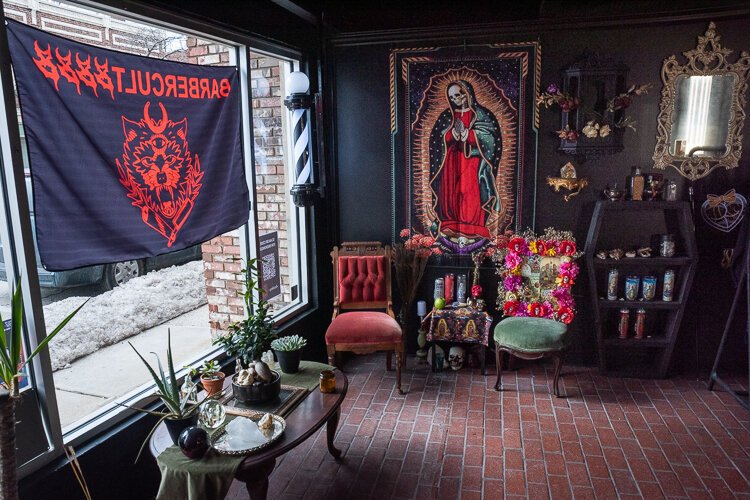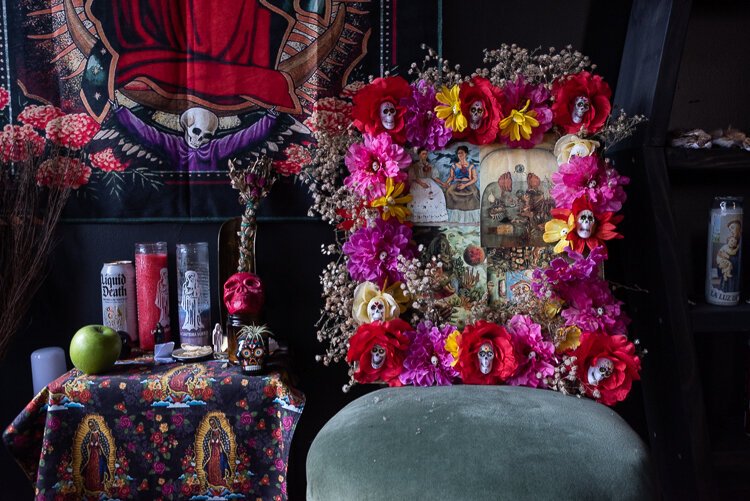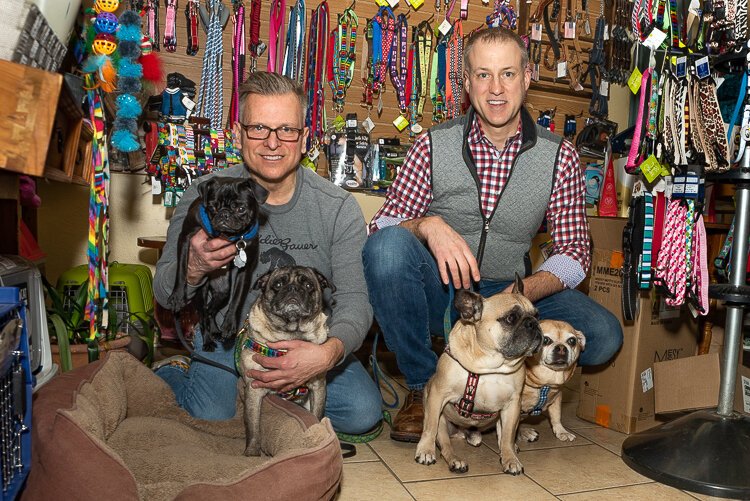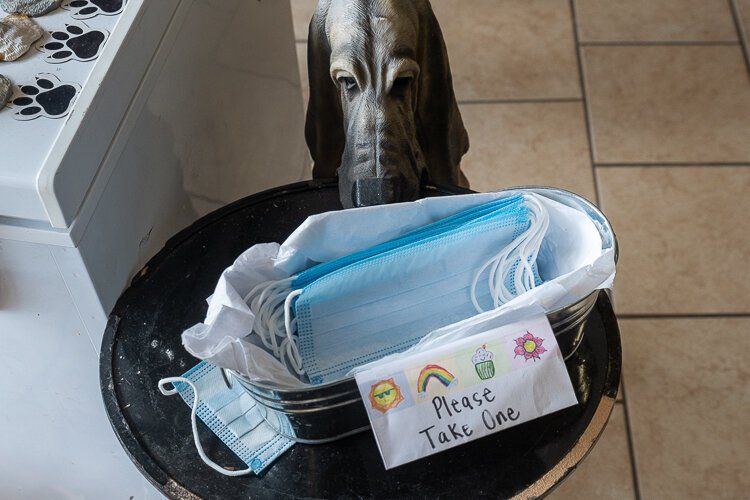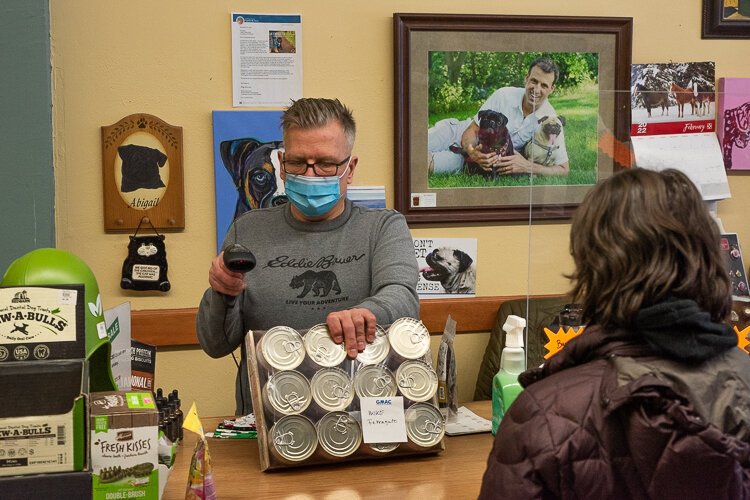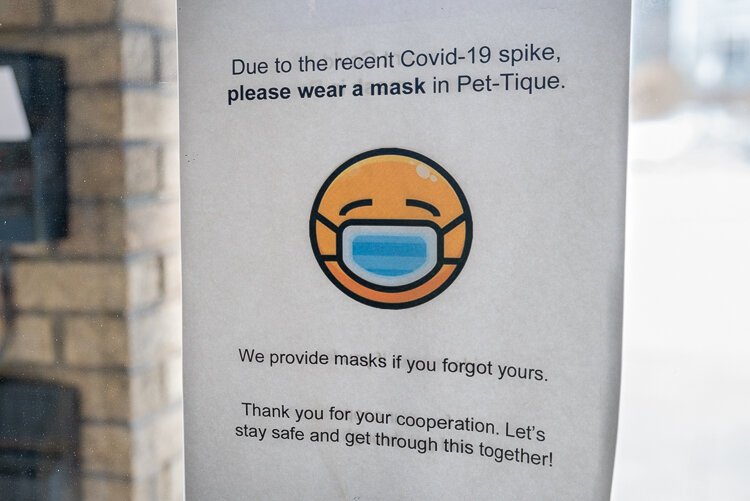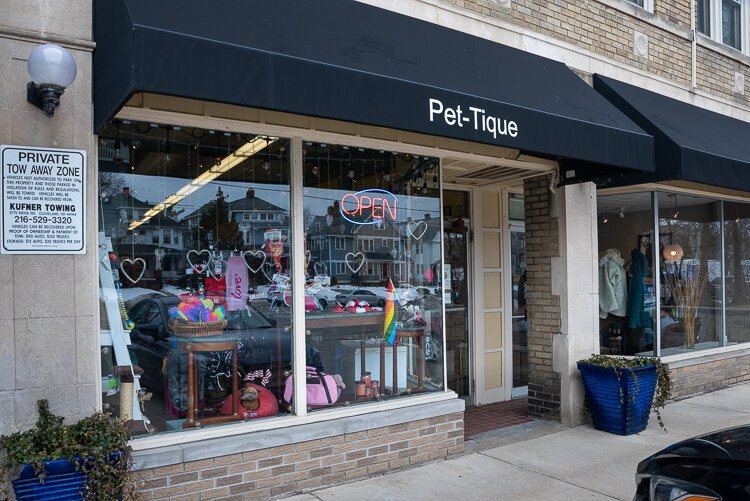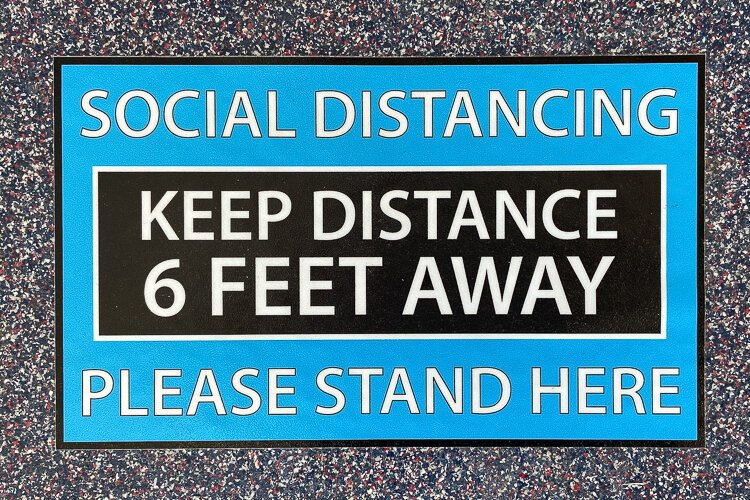Weathering the storm: How some LGBTQ+ businesses survived the pandemic
When COVID-19 began to spread in early 2020, printer Edward Hamner, who owns Howling Print & Promo in Chardon, had to move fast to adapt to thepandemic’s challenges.
“You had to pivot real quick,” he recalls.
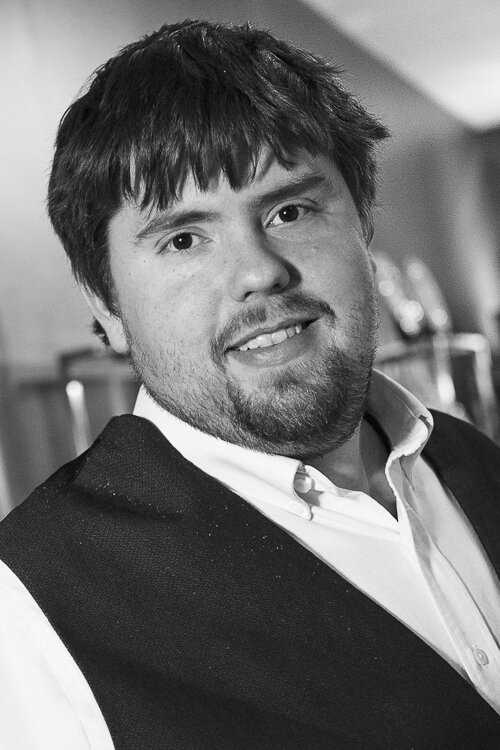 Ed HamnerHamner made canopies and hundreds of socially distanced foot markings for the Cuyahoga County Board of Elections. He cranked out 17,000 curbside pickup signs for Walgreens stores around the country.
Ed HamnerHamner made canopies and hundreds of socially distanced foot markings for the Cuyahoga County Board of Elections. He cranked out 17,000 curbside pickup signs for Walgreens stores around the country.
And, from his conservative hometown, Hamner kept turning out products for his fellow LGBTQ+ entrepreneurs around the region.
The pandemic has killed many businesses and bled many others of customers, workers, supplies, and revenues. But it has given many businesses new opportunities. Mostlocal LGBTQ+ entrepreneurs interviewedsay they’re weathering the ordeal—thanks in part to rising support from individuals and institutions in the LGBTQ+ community and beyond.
Daniel Budish of Studio West 117, a LGBTQ+ hub that began to open last year on the border of Cleveland and Lakewood, says, “We are thrilled with the way that we’ve been able to come together as a community.”
In a June 2021 report put out by CNBC and the investment app Acorns with the National LGBT Chamber of Commerce (NGLCC), stated that most LGBTQ+ entrepreneurs were struggling. Some 19% of the entrepreneurs had cut their budgets, and 17% had cut wages.
But only 10% of those surveyed had closed their businesses temporarily, while less than 1% had shuttered for good. Nearly 80% of the entrepreneurs expected full recoveries this year.
“Like others in the small business community, many LGBTQ-owned businesses were upended by the pandemic, says Mary Duffy, CNBC vice president. “But recovery is getting closer, and the future is looking brighter.... They have made huge sacrifices and overcome distinct challenges to make their businesses stronger.”
The pandemic has pushed many consumers to global websites, but Jeanita Blue of Cleveland’s growing Blue International Marketing says it also made them newly appreciate local entrepreneurs, especially minority ones. “It made businesses more personal,”says Blue, who has helped market Studio West and hopes to move her office there.“People connect with the honesty and the struggle.”
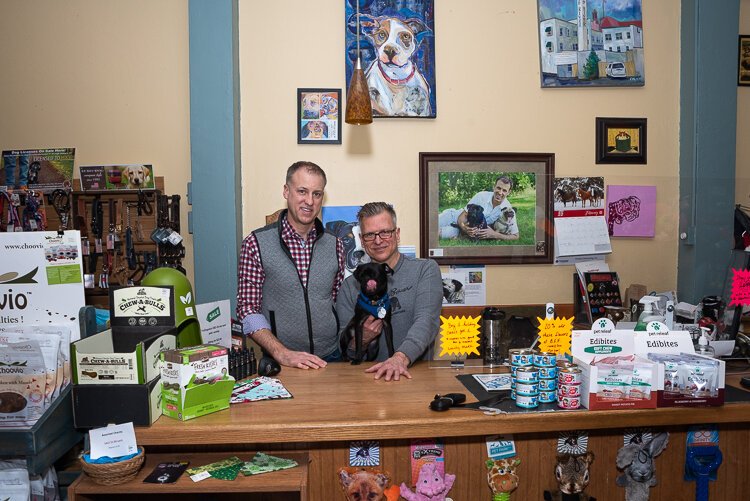 Customer Sean Andrews says he shops at Pet-Tique on Clifton Boulevard in Cleveland’s Edgewater neighborhood not because the owners are LGBTQ+ but because they’re local. “I like local,” says Andrews. “I like the personal touch.”
Customer Sean Andrews says he shops at Pet-Tique on Clifton Boulevard in Cleveland’s Edgewater neighborhood not because the owners are LGBTQ+ but because they’re local. “I like local,” says Andrews. “I like the personal touch.”
But Phyllis Harris, executive director of the LGBT Center of Cleveland, says she goes to Barbercult, which opened last year at Studio West, partly because of the shop's orientation. "It feels great to be my Black lesbian self and get the short lesbian cut I love.”
Many individuals and institutions have reacted by trying harder to include minorities of all kinds. “We’ve seen a lot more push for ‘Let’s support minorities, LGBTQ+, disadvantaged,’” says printer Hamner, “which has opened up a lot of new opportunities, if you can find them.”
Cleveland’s Plexus LGBT & Allied Chamber of Commerce, which has 290 members locally and downstate—some LGBTQ+, and others allies. They range from sole proprietors to big corporations like Eaton and American Greetings to nonprofits like the National Inventors Hall of Fame. With help from Plexus, 22 entrepreneurs have become certified nationally as LGBTQ+, making them eligible for minority contracts, and another 12 have started to apply.
Amanda Cole, Plexus executive director, says LGBTQ+ entrepreneurs lean toward retail. That sector has been hit especially hard by the pandemic, which closed non-essential stores awhile and continues to scare off many customers.
Studio West’s Budish adds that LGBTQ+ people are particularly leery about gathering places. "The LGBTQ+ community has faced the AIDs and HIV pandemic, so we are more attuned to the challenges,” he says. “Somebody with multiple health conditions would be more cautious."
The pandemic has boosted demand for some products but shrunk availability of supplies. For instance, Hamner couldn’t find his usual T-shirts for printing.
“As quick as you could refresh the page, the inventory was gone,” he says. He says he finally switched to a costlier line and swallowed the upcharge.
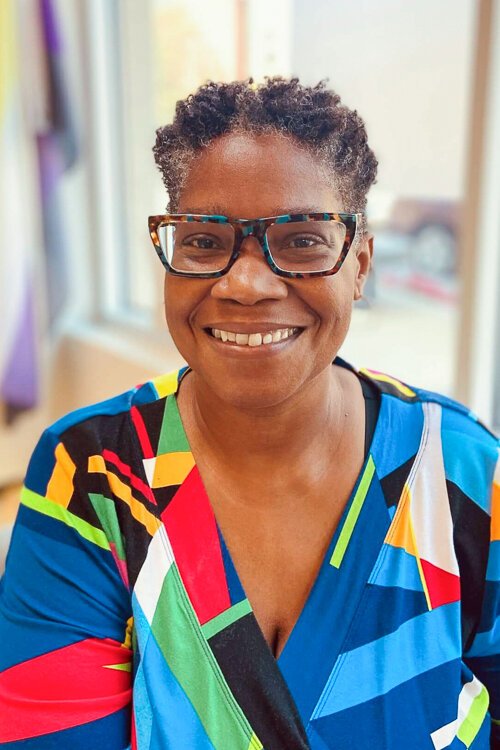 On the good side, Hamner says many big businesses have diversified their suppliers lately for reliability as well as inclusion.
On the good side, Hamner says many big businesses have diversified their suppliers lately for reliability as well as inclusion.
Like most hardships, COVID-19 seems to hurt disadvantaged groups more, who tend to have worse health and worse health care. According to the U.S. Centers for Disease Control, LGBTQ+ people are likelier than others to have health problems that correlate with severe COVID-19 symptoms.
And, according to a Kaiser Family Foundation report last August, 49% of LGBTQ+ people said the pandemic has significantly hurt their mental health, about double the rate for other people.
At the LGBT Center, Reaver Nelson of Pearl Counseling Services says many have suffered psychologically, especially minorities of any kind. “The pandemic has magnified so many stresses for people who were already struggling day to day, experiencing discrimination and marginalization.”
The pandemic challenges counselors, too. Says Nelson, “In the early period of the pandemic, when I was getting adjusted, of course there was a lull, and I had to hold off on referrals.” But she began to offer counseling remotely, and some clients turned out to be more comfortable that way. “My practice has grown because of all these options.”
The pandemic has challenged LGBTQ+ entrepreneurs in many fields. A 2015 Gallup poll found that they tend to be relatively young and inexperienced. A 2018 report by the nonprofit StartOut adds, “Many LGBT entrepreneurs have encountered unequal access to key resources needed to advance their businesses including a lack of visible role models, an inability to locate mentors, or being denied access to capital.”
Many local entrepreneurs say they’veapplied for the Paycheck Protection Program aid, bank loans, or other support with mixed results, though not with any apparent discrimination. Many have dipped into their scant reserves. Cole and Budish also say that LGBTQ+ proprietors are less likely to inherit family businesses or have big families helping out.
In an exception, Harriet Logan’s mother helps her stock Loganberry Books in Cleveland’s Larchmere neighborhood.
Despite the pandemic, or maybe because of it, many new businesses have arisen. Ohioans set a state record in 2020 by filing 171,073 new ones, then shattered it in 2021 with 197,010.
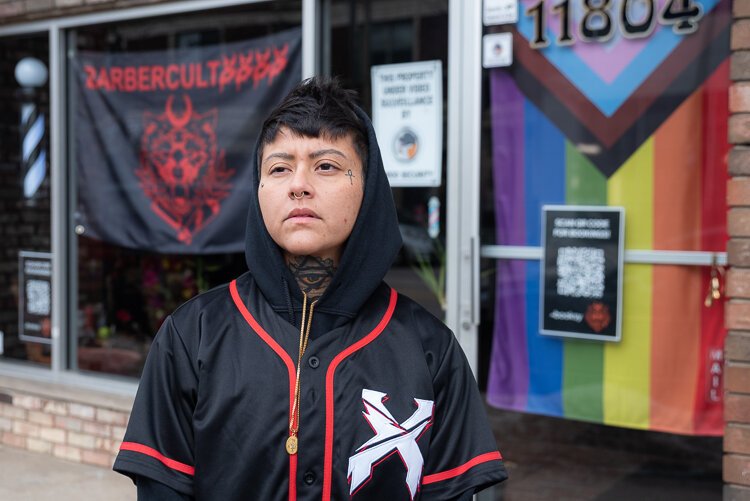 Ariana Perez says the pandemic slowed traffic last fall, when she opened
Ariana Perez says the pandemic slowed traffic last fall, when she opened
There seem to be as many stories about the pandemic as there are LGBTQ+ stores. At the 20-year-old Pet-Tique, partner Kevin Schmotzer says, “It’s been a roller coaster.” Early on, he ordered a huge stock of pet food. It sold out fast at curbside. He eventually got more food and reopened the store but still limits occupants and requires masks.
It helps Pet-Tique that many homebound people have bought pets for companionship. It also helps that Schmotzer specializes in entrepreneurship at his day job as the City of Cleveland’s executive of small business development.
Logan says the pandemic has hurt her 27-year-old bookstore. She has gained some online sales but lost far more in-person ones. She also had to put her Edible Books Festival online, where customers couldn’t eat the tasty tomes.
Some entrepreneurs say that the pandemic has hurt them, but not as much as they might have expected. At Tours of Cleveland, out-of-town customers dwindled but locals flocked to his walking tours.
“It was a way to get out and have fun,” says owner Scott O’Con. “We did pretty well, all things considered.”
 Nick and Steve Duve had to sell their slumping Candle Studio at Pinecrest in Orange Village. Then, Steve went back to a good job in insurance, while Nick got his real estate license and also booked DJ gigs through late next year.
Nick and Steve Duve had to sell their slumping Candle Studio at Pinecrest in Orange Village. Then, Steve went back to a good job in insurance, while Nick got his real estate license and also booked DJ gigs through late next year.
“We’re extremely happy with this outcome,” says Nick.
Many entrepreneurs are open about being LGBTQ+—often displaying rainbow flags and goods with LGBTQ+ themes. Pet-Tique sells doggie shirts that say, “I love my two daddies.”
Says Cleveland’s Lisa Sabol, who last year opened The Uncommon Groundskeeper, a Northeast Ohio home and commercial improvement company.
“Being transparent with the fact that I am LGBTQ+ helps weed out clients I wouldn’t wish to spend time with, Sabol explains. “If people don’t want me to work with them, I don’t hear about them.”
Hamner says it helped that he’d come out a couple of years before the pandemic. “I literally had a client look me in the face: ‘I won’t work with you.’ He turned around and walked out the door.” Hamner lost most of his clients fast. Then he closed the business, reopened it, and gained plenty of new customers, LGBTQ+ or straight.
Barber Perez says her identity seems to discourage some customers and encourage others. “I’ve had men come and walk up to my door and see I’m a female and completely walk away. I’ve had transgender people come and say they saw I’m a gay barber and that’s exactly what they’re looking for. I have straight clients; they see me for me, and they support me.”
Many entrepreneurs say they’ve gotten valuable help from Plexus. Hamner says, “I can’t say enough about the Plexus community. That’s where a good chunk of my business has come from.”
Plexus at the end of 2021 compiled a LGBTQ+ business directory with Crain’s Cleveland Business. The directory features 58 Northeast Ohio businesses that are at least 51% owned by individuals identifying as LGBTQ, as well as local nonprofits focused on LGBTQ issues.
Company owners can visit Crain’s data center to add their businesses to the directory, or anyone can download a free Excel version of the directory.
Learn more about Plexus by visiting the website and visiting its Business and Member Directory. Learn more about LGBTQ+ business certification and the many benefits of this designation.
This story is sponsored by the Northeast Ohio Solutions Journalism Collaborative, which is composed of 16-plus Northeast Ohio news outlets including FreshWater Cleveland.


